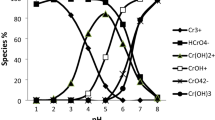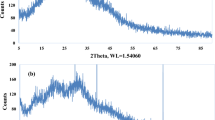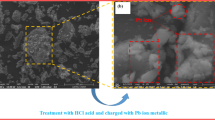Abstract
IT has been shown1 that cations may be precipitated around the beads of an anion exchange resin in a column, when passed in aqueous solution through the resin, which is in a form providing a suitable anion. For example, when a cobalt solution is used with a resin in the sulphide form, cobalt sulphide is formed around the beads of resin. The nature of these precipitates suggested that fairly high concentrations of precipitating anion were present in the region of the surface of the resin particles.
This is a preview of subscription content, access via your institution
Access options
Subscribe to this journal
Receive 51 print issues and online access
$199.00 per year
only $3.90 per issue
Buy this article
- Purchase on Springer Link
- Instant access to full article PDF
Prices may be subject to local taxes which are calculated during checkout
Similar content being viewed by others
References
Glueckauf, and Roberts, U.K. Atomic Energy Authority, A.E.R.E C./R.1443.
Author information
Authors and Affiliations
Rights and permissions
About this article
Cite this article
JAMES, R., WELCH, G. Adsorption of Trace Amounts of Cations on Anion Exchange Resins by the Formation of Insoluble Salts. Nature 177, 183–184 (1956). https://doi.org/10.1038/177183b0
Issue Date:
DOI: https://doi.org/10.1038/177183b0
Comments
By submitting a comment you agree to abide by our Terms and Community Guidelines. If you find something abusive or that does not comply with our terms or guidelines please flag it as inappropriate.



